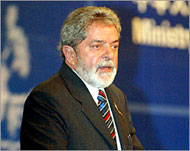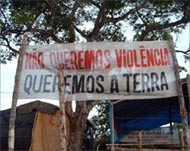Landless peasants to march on capital
Brazil’s largest social movement announced this week a march on the capital Brasilia to push for much needed land reform.

The massive protest, due early next year, would be a huge financial and strategic undertaking, and comes amid deteriorating relationships between grassroots movements and the government.
The call to march comes after President Luiz Inacio Lula da Silva snubbed a gathering of landless peasants last month.
Previously described by the peasant movement as a “historic friend of the cause”, the president reneged on a promise to appear at one of the biggest conferences of social movements ever held in the capital.
Economy vs reform
The four-day National Conference of Land and Water took place at a brightly coloured sports stadium near the Brazilian parliament, the Congress.
Disappointed peasant leaders said the president would have come had they been 12,000 businessmen.
“There is an incompatibility between economic policies and agrarian reform,” said Joao Pedro Stedile, leader of the landless peasants’ movement, the Movimento Sem Terra (MST).
“If the economic policies don’t change, you could stick Jesus Christ in Incra [Brazil’s land reform agency] but he wouldn’t make agrarian reform.”
Protest
About 9000 protesters surrounded the Central Bank on 25 November at the end of the conference, chanting for the resignation of its head, Henrique Meirelles, and that of the treasury minister, Antonio Palocci.
 |
|
IMF director Rodrigo de Rato has |
They accused the government of cutting funds for land reform in order to meet International Monetary Fund targets and continuing the neo-liberal policies of the previous administration.
But, instead, Meirelles’ position was strengthened last week with the passing of a controversial law that grants him the status of minister and gives him impunity from prosecution in all but the Supreme Court.
He had faced allegations in July over a failure to declare income earned as the ex-chief of Fleet Boston in the US to Brazilian tax authorities. He denies the accusations.
Spat deepens
Riled and running out of patience, the social movements are upping the stakes. In announcing the Marcha para Brasilia, on a date early in 2005, they are laying the ground for their biggest fight yet.
 |
|
President Lula risks losing |
The seat of power, Brasilia is a planned city in the centre of the fifth-biggest country in the world – equidistant from all major cities but at least a 1000km from any of them.
“The government is in debt to the social movements,” reads a statment signed by several of the largest and most militant groups including Via Campesina and Grito dos Excluidos.
“Before being elected they took a promise to honour all of the contracts including the National Plan of Agrarian Reform but up until now, they haven’t kept them. The Brazilian people are waiting.”
Resettlement promise
President Lula had promised to resettle 400,000 families on their own tracts of land within his first four-year term of office, but halfway through only a quarter of that figure has been resettled.
 |
|
A peasants’ banner says: We |
The MST says up to 200,000 families are camped waiting for a plot of land, often living in desperate situations with scarce water, no electricity and makeshift tents made from plastic sacks.
Brazil has the worst concentration of land ownership in the world – less than 1% owns more than half the land. Yet 30% of the 850 million hectares of land in Brazil is without a registered owner.
The MST was 20 years old in 2004 and took part in more of its trademark land occupations than ever before.
According to Incra, there were 271 separate occupations this year up until the end of August 2004.
Attack
But the landless are continuously under threat of attack from the armed owners of the land they invade.
 |
|
A farmer watches landless |
In the most violent confrontation, five MST members were shot dead and another 13 hit by bullets, including a 12-year-old girl in Felisburgo, Minas Gerais, on 20 November. Masked gunmen then set fire to 100 tents in the encampment.
Amnesty International condemned the latest attack. “A long history of impunity on behalf of those who violate human rights and practice violent action against the MST and other groups prepared the way for these murders,” it said.
Rolf Hackbart, the head of Brazil’s land reform agency, caused uproar when he suggested that agribusiness was behind the latest assassinations.
Massacre
It happened just 48 hours after the final judgment of the perpetrators of the worst massacre in the movements’ history at Eldorado dos Carajas which left 19 dead and 65 injured in 1996.
Eight years on, the court upheld an earlier acquittal of 143 lower-ranked police officers who took part in the infamous attack on 2000 landless farmers. But it upheld the conviction of the joint commanders of the operation, Mario Colares Pantoja and Jose Maria Oliveira, for a legal maximum of 30 years each.
They had remained free men throughout the legal process, despite the original conviction in 2002. Warrants have been issued for their arrest but as yet there are no reports that they have been taken into custody.
Miguel Rosetto, minister for agrarian development said: “We have to admit that there exists a violent atmosphere in Brazil which was not created by this government.”